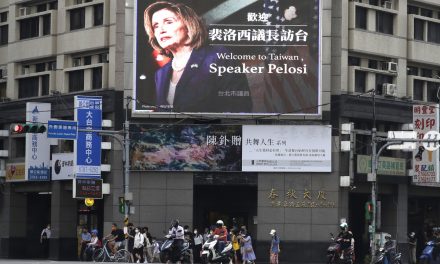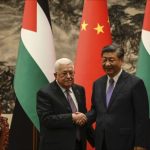BY BRADLEY A. THAYER AND LIANCHAO HAN
The Biden administration has provided an initial formulation of its approach to China and now should advance a “Biden Doctrine” that declares support for all those resisting the Chinese Communist Party (CCP). To advance this strategic objection, such a doctrine should contain five components to ensure that China’s expansion is checked by the U.S. and its friends and allies.
First, and foundationally, declare China a totalitarian regime and U.S. adversary. China is not a competitor where cooperation is possible. It is a hostile and malignant force. “Extreme competition,” as President Biden identified, will occur in all fronts because Beijing is a geopolitical rival whose strategic and military objectives seek to negate those of the United States. The CCP leadership wishes the United States ill — quite literally seeking to overturn the world order through its accelerated aggression, deception about the COVID-19 pandemic, production of counterfeit personal protection equipment, and fentanyl exports.
Unfortunately, a generation ago, the United States invited this adversary to enter and then to thrive within the Western financial, economic, political and technological ecosystems. Removing it will require a necessary but prodigious effort, identified and supported by the Biden administration. A doctrinal statement is a necessary step to achieve this.
Second, the U.S. must stand with all entities against the threat from China. Allies have been supported by Biden’s and senior officials’ declarations, to be sure, but they also must receive substantive support to resist China’s efforts at coercion and intimidation. The U.S. needs allies to balance against Beijing, but also because they are at the forefront of China’s aggression and must be supported in their efforts to resist China’s power. In all cases, China’s pressure is simultaneously political and economic — militarily, too, in some cases, such as against India, Japan and Taiwan. Thus, the U.S. response will have to be tailored to address the specific threat, while also anticipating that Beijing will increase pressure. Beijing’s political and economic measures are likely to give way to implicit or explicit military threats.
Many U.S. friends and allies have demonstrated the mettle to stand up to China’s political, economic or military aggression. Australia is subject to political warfare attacks and Australian goods are banned by China in a lopsided trade war to injure Canberra’s economy and coerce its government. Taiwan is under threat of invasion and should be provided with the training and resources it needs for a conventional deterrent. Vietnam faces China’s persistent attempts to strong-arm Hanoi over Beijing’s illegal territorial claims in the South China Sea.
In Europe, China’s pressure so far is more political and economic. Canada terminated joint Arctic-training military exercises with Beijing; it is rather remarkable that such cooperation existed in the first place. Lamentably, Canada was not alone in conducting military exercises with China. Germany and the U.S. have done so as well. Ottawa and the United Kingdom are also using their immigration policies to help Hong Kongers escape the grip of the National Security Law imposed by Beijing. The U.K.’s Foreign Office has tasked businesses with ensuring that their Chinese supply chains do not use forced labor, and Ofcom, the U.K.’s media regulator, has denied Star China Media Ltd. a license to broadcast in Britain. The BBC is subject to retaliation from China because of its reporting on the Muslim genocide in Xinjiang.
Biden should address each of these cases and declare support for U.S. friends and allies — now and in future efforts. Moreover, a Biden Doctrine should encourage other traditional friends and allies, such as New Zealand, to recognize the threat from the CCP.
Third, the U.S. must capitalize upon these efforts. The nucleus of states willing to resist Beijing must be expanded to include others and involve parallel steps to increase U.S. support, including diplomatic, economic and, if necessary, military measures. Biden must declare that all entities resisting the CCP can depend upon U.S. support, and the United States must encourage movements that are struggling against the CCP’s oppression. This would include movements worldwide, such as in Balochistan, where there is resistance to the China-Pakistan Economic Corridor and, more broadly, resistance to China’s control of Pakistan’s politics and hijacking of Pakistan’s interests, independence and sovereignty. The U.S. must offer support to the global imposition of sanctions on the CCP for its wide-ranging human rights violations.
Fourth, the Biden Doctrine should illuminate how the United States will aid the Chinese people to advance their civil rights and religious freedoms. This would include boycotting the 2022 Beijing Olympics as an important symbol against China’s human rights abuses. But actions must center on trade and finance. All entities doing business with China should be required to adhere explicitly to human rights for their businesses and Chinese associates, and provide the U.S. government with evidence of progress in support of human rights. But the biggest help the U.S. can offer is to tear down China’s “Great Firewall.”
Fifth, unlike previous U.S. presidential doctrines, Biden should include a domestic component to address the CCP’s economic, political and technological penetration of the U.S. and other Western countries. Biden should declare that CCP influence is illegitimate and corrosive to the health of the U.S. economy, national security and political principles, and that the U.S. will remove the CCP’s influence on its financial markets, society, media, universities and technological centers.
A Biden Doctrine is a necessary declaration to identify and combat the CCP threat. Conflicts with China are inevitable because China’s expanding, non-negotiable core interests undermine America’s very existence. Such a doctrine would make a necessary and forceful contribution to the preservation of U.S. global interests, including human rights and support for allies and friends, and of health of the U.S. economy and society.
This article first appeared in The Hill on 02/10/21 4:00 PM ET
























